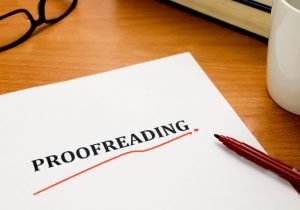Proofreading Academic Paper: 7 Steps to a Stellar Quality
It feels amazing to have an academic paper done. You have researched everything deeply, found great contextual proofs, backed your ideas with information from the up-to-date sources and came up with some outstanding results. There is only one step standing between you and paper submission, and it is proofreading. Lots of students skip this point, hoping that their research efforts and bright ideas will compensate for technical mistakes and omissions. The sad truth is that they won’t.
The good news is that we know how to deal with proofreading your academic papers fast and efficiently. Follow this roadmap and your efforts will be rewarded.
Step 1. Use some free online grammar-checker.
It won’t find serious mistakes, but it will help with  technical omissions, like lost letters, serious punctuation fails, merged words, etc. It is good to copy text by abstracts to the checker and read it once again, while the program works. It narrows your attention, and you can find more phrases which need to be polished.
technical omissions, like lost letters, serious punctuation fails, merged words, etc. It is good to copy text by abstracts to the checker and read it once again, while the program works. It narrows your attention, and you can find more phrases which need to be polished.
Step 2. Let the passive voice go.
If your academic papers are full of passive voice, don’t consider it as your fault. For decades it was considered to be some sort of good manners to use this form of grammar structures in academic pieces of writing and all those papers you’ve read influenced your style. Nevertheless, nowadays more and more professors want grammar structures in your essays to be strong, thus active. Your paper should be closer to a high-quality non-fiction, than to a dissertation from 70-s. Of course, in most cases you are still not allowed to use constructions like “I think”, “we wonder” and others. Other than that don’t be afraid to change “it was researched by biologists” with “biologists researched it.”
Step 3. Make a use of “So what?” question.
Students know that their papers should make sense in general, but they often forget that it means every abstract should have the meaning too. Read abstracts one by one and after each ask yourself: “so what?” The answer to this question should be contained in the next abstract. If it is not, there is a lack of logic in your academic narrative.
Step 4. Read your paper out loud.
It is the best way to eliminate wordiness and cut on too pretentious words. Remember that Nobel Prize works are among the most flawless and polished, and they are nominated not for using lots of words longer than 12 letters. If reading out loud you get stuck in the middle of the sentence, it is the place where you should put a dot. If you get stuck reading one word for 3 times, you should consider replacing it with something less complicated. Your professor is your reader, make him or her enjoy your academic story.
Step 5. Check citations with Ctrl+F.
It is the simplest way not to lose any citation. Scroll the paper down and Ctrl+F any surname you find. Press Enter till you reach the bibliography section. Is it there? You are fine. Do the same from down to top, checking whether all sources cited in a reference list are mentioned in the paper’s body. It might sound strange, but it is easy to lose a citation during the final editing, and not proper citation may be seen as a form of plagiarism.
Step 6. Check the formatting.
It is always very annoying to get lower grades for such things as formatting, as they don’t represent how hard you worked on the research paper. Open Purdue Owl and check the major points – margins, headings, title page and a proper formatting of your bibliography.
Step 7. Make a pause and read it again.
Of course, it is hard to do it if your deadline is burning right in front of you. However, we practically insist you give at least the short break, breathe some fresh air, take a shower, have a glass of water (only water) and then get back to reading your paper. Even without too deep analysis, you will definitely find some weak places or omissions easy to deal with in the remaining time.
You are all set! Print it, or send it and wait for a well-deserved impressive grade and positive feedback from your professor.
